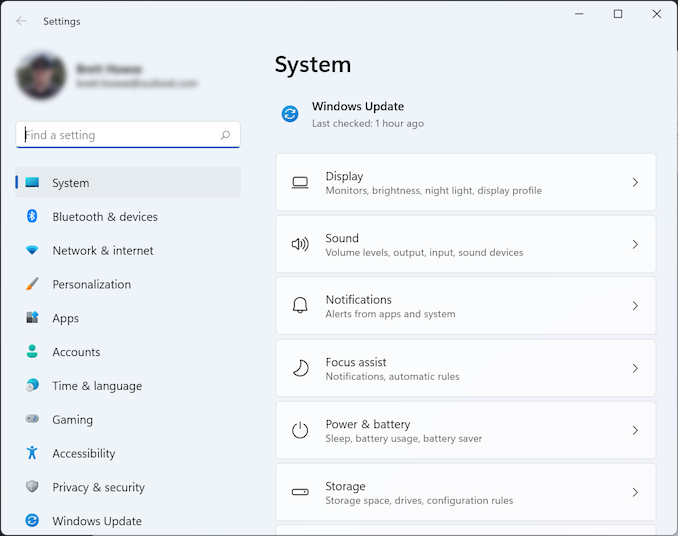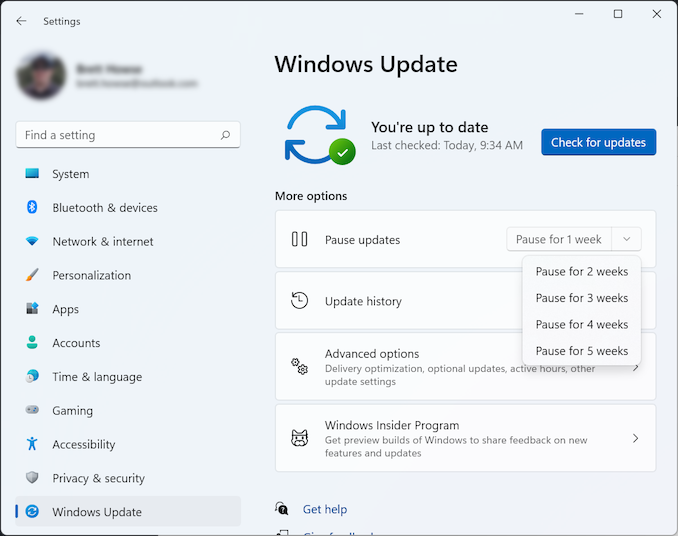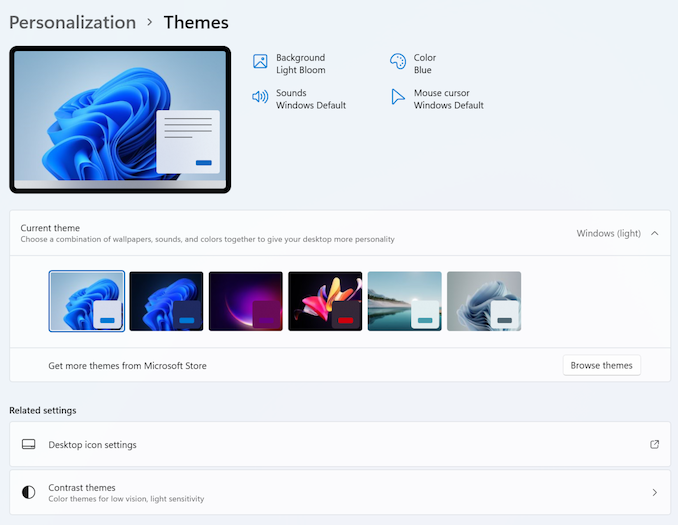What to Expect with Windows 11: A Day One Hands-On
by Brett Howse on October 4, 2021 4:00 PM EST- Posted in
- Software
- Operating Systems
- Windows
- Microsoft
- Windows 11
Initial Thoughts
Windows 11 has some mighty big shoes to fill. Windows 10 is installed on over a billion active devices around the world and has done an admirable job cleaning up the mess that was Windows 8. Windows 11 comes along at a very different moment in time. It is also a fundamentally different upgrade than Windows 10 was. Microsoft’s goal with Windows 10 was to get as many people onto the new OS as possible, but Windows 11 clearly does not have that goal in mind.
While ultimately a facelift of Windows 10, Windows 11 both gives and takes away. The new interface is genuinely intuitive, well-designed, and colorful. But the new interface hides just how much customization and personalization Windows used to allow. In a very un-Microsoft stance, they are basically telling people that if they don’t like how something works, too bad. The company is known for bending over backwards to not remove functionality, but Windows 11 cuts out features with a hacksaw. Did you like the Timeline feature added in Windows 10? Sorry it is gone. Do you like your taskbar on the top? Unfortunately, you are not allowed to move it. Do you want to use a browser other than Microsoft Edge? Well, you can, but it is far more work to change the default than it used to be.
Perhaps these changes are a result of Windows losing mindshare. In the past, Windows was too big of a thing to change. With the rise of smartphones, maybe now is the first time the company has felt that they can make a clean(ish) break with the past. The new hardware requirements are also going to force a clean break, as a good number of Windows 10 devices will never be allowed to update to Windows 11.
That is of course an oversimplification. This is still Windows after all. If you really want to change something, there will be ways to do it. Buried beneath all the new UI goodies is the familiar Control Panel, as an example. Registry changes will be found. Programs have already been created to get around some of the silly customization limitations in Windows 11.
I’ve only a had a short time with Windows 11, and that is partially due to how short of a public beta that it got compared to Windows 10. Already there are some features that I really enjoy. The new interfaces are well thought out and easy to use. But for me, the true test is using a new version of the OS and then stepping back to an older version. How painful is it? How many of the new features do I miss? There is no single item right now that is a must-have, so swapping between Windows 10 and Windows 11 is not a huge deal. And that’s good because Windows 10 is going to be around for years to come still. Some of the biggest new features announced for Windows 11 won’t even be shipping until next year. Perhaps if and when they arrive that will make the difference.
Thankfully, there is no rush to upgrade. If you are interested in checking out Windows 11 and your computer meets the stringent hardware requirements, it will be available late this year as an update. For those that do not want to change, there is no need. At least not yet.













95 Comments
View All Comments
relux - Monday, October 4, 2021 - link
I haven’t had any major issues with it so far (for desktop use to be clear). Virtualization through HyperV is slightly faster (running on one Epyc 7742). CPU compute performance is slightly higher than Server 2019 Datacenter, yet slightly lower than Server 2016 Datacenter (and much lower than Debian or Clear Linux). I’m not seeing any change in IO performance with Optane or NAND storage. Lots of security options that look like they’d hurt performance though. Overall it’s more of the same.cc2onouui - Wednesday, October 6, 2021 - link
Well I'm with you on the fact that android is a complete garbage compared to windows, Linux on the other hand is only a failure on a adoption, the OS have nothing to do, DirectX "and" MS support for windows apps developers is an important key factor, no matter what a superior Linux you build the users will not give up their games and apps library, games developers rarely consider Linux, the shitty android has a big store you can't ignore, a device with android installed is a shame on a compute machine, Apps stores density decides what share an OS will take, most people will buy even Xbox "one" instead of a cheaper PS5 if PS5 has only one gameDolda2000 - Wednesday, October 6, 2021 - link
>Ever since mobile came around, any semblance of real computing went out the window and it's like nobody even noticed.I realize this may sound elitist, but if you were relying on GUI programs, you were always using dumbed-down computing. If anything, I've been having more of the feeling that developers have started realizing that more and more, adopted their GUI stuff accordingly, and left the real computing to people who are comfortable with the edifices of real computing with command-line interfaces, editing config files or registry entries, programmatic interfaces, &c&c.
As someone who has always live in that world, I've only noticed "realm computing going out the window" as a thing in my peripheral vision, and I kinda understand why developers do it that way. It's just focusing the proper resources where they're needed.
AnnonymousCoward - Wednesday, October 13, 2021 - link
Microsoft doesn't give a shit about user experience. If they did, everything would open instantly, you'd be able to customize UI's including font sizes, and you'd be able to resize the Teams window to be as small as you want. They only seem to prioritize the experience of their own developers.rmfx - Monday, October 4, 2021 - link
It looks amazing! Finally good tastes in a Windows UI.Now, time to refresh all the crap that is not visible to the end-user as well.
philehidiot - Monday, October 4, 2021 - link
Hey, I rather like finding Windows 3.11 or NT remnants....Nah, you're right, it's dogshit. If it wasn't for a single bit of expensive hardware with no Linux support, I'd be on Linux right now. Instead, I get to have lots of VMs and wonder what might have been.
I do have a Windows 95 VM. It's genuinely horrific realising how responsive Windows 95 was Vs the wading through treacle that is Windows 10. I might bring back Windows RG.
GeoffreyA - Monday, October 4, 2021 - link
Right up till XP and Server 2003, things were quite fast. Vista is where the treacle got pumped in.yetanotherhuman - Tuesday, October 5, 2021 - link
It's true. Windows 7 helped a bit (mostly with regards to graphics performance and memory usage) but since then it's been nothing but bloatTheinsanegamerN - Tuesday, October 5, 2021 - link
7 was also helped by the explosion in powerful hardware. Vista came out in 2006. 7 in 2009. Larger pools of system memory, DDR2, early DDR3, high clocked dual core Core 2s and athlons and video cards with higher core counts and memory speed had replaced the widespread 64MB or less GPUs, pentium IV CPUs, and 512MB memory pool systems vista was trying to be loaded on.7 really doesnt run well on the configs that vista didnt run well on either.
GeoffreyA - Tuesday, October 5, 2021 - link
I think the secret of 7 was actually the greater polish, sanding away Vista's rough edges. Colours were noticeably toned down, there was translucency for maximised windows, bigger min/max/close buttons, rotating wallpaper, the glorious animation on the Start menu pearl, a taskbar worth its weight in gold, faster booting. It's these little touches, that last 1%, that took it into excellence Vista never reached. Yet Vista did most of the hard work.